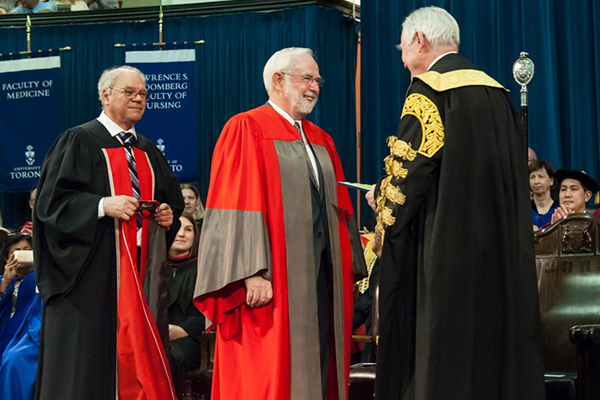William Leggett receives prestigious lifetime achievement award
 Dr. William Leggett.
Dr. William Leggett.William Leggett, professor emeritus in the Department of Biology and Queen's 17th principal, has received the H. Ahlstrom Lifetime Achievement Award from the Early Life History Section of the American Fisheries Society for his contributions to the fields of larval fish ecology.
The American Fisheries Society is the biggest association of professional aquatic ecologists in the world, with over 9,000 members worldwide.
"It feels good to be singled out by such large group of people who I respect so highly," says Dr. Leggett. "I didn't expect to receive this award so it's a big honour and thrill to get it."
Dr. Leggett's research focuses on the dynamics of fish populations and his work as a biologist and a leader in education has been recognized nationally and internationally. A membership in the Order of Canada, a fellowship from the Royal Society of Canada, and the Award of Excellence in Fisheries Education are just some of the awards he has received for outstanding contributions to graduate education and marine science.
The Early Life History Section of the American Fisheries Society recognized Dr. Leggett's "exceptional contributions to the understanding of early life history of fishes that has inspired the careers of a number of fisheries scientists worldwide and has led to major progress in fish ecology and studies of recruitment dynamics."
The award was recently presented in Quebec City at the 38th annual Larval Fish Conference held in conjunction with the 144th annual meeting of the American Fisheries Society.


![[Richard Ascough]](/web/20170613135437im_/http://www.queensu.ca/gazette/sites/default/files/assets/WEB%20Richard%20Ascough.jpg)


















![[Art McDonald]](/web/20170613135437im_/http://www.queensu.ca/gazette/sites/default/files/assets/WEB%20Art%20McDonald%20Herzberg%20LEcture.jpg)
 The 12th annual Kingston Conference on International Security, taking place June 12-14, will bring together academics and military leaders to examine future enhancements to the physical, intellectual and social capabilities of soldiers. Panelists will also discuss the challenges in balancing the need for military effectiveness when enhancing individual performance with a commitment to reflect society’s values and norms.
The 12th annual Kingston Conference on International Security, taking place June 12-14, will bring together academics and military leaders to examine future enhancements to the physical, intellectual and social capabilities of soldiers. Panelists will also discuss the challenges in balancing the need for military effectiveness when enhancing individual performance with a commitment to reflect society’s values and norms.